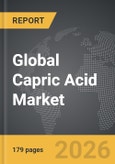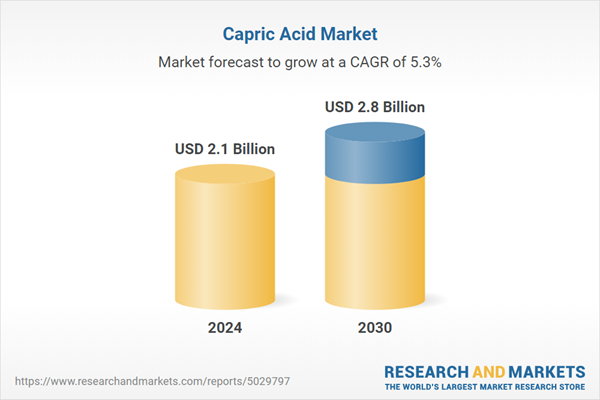Global Capric Acid Market - Key Trends and Drivers Summarized
Why Is Capric Acid Gaining Prominence in Various Industrial and Consumer Applications?
Capric acid, also known as decanoic acid, is increasingly becoming a vital component across a range of industries, from food and beverages to cosmetics, pharmaceuticals, and even bio-based industrial applications. Derived from natural sources such as coconut oil and palm kernel oil, capric acid is a medium-chain fatty acid known for its versatility and beneficial properties. In the food industry, it is widely used for its antimicrobial qualities, serving as an effective preservative that helps extend the shelf life of processed foods and beverages. The acid's natural origin makes it highly attractive for manufacturers seeking clean-label ingredients in line with growing consumer demand for natural and organic products. In the personal care and cosmetics industries, capric acid is valued for its emollient properties, which help soften and condition the skin, making it a popular ingredient in moisturizers, lotions, soaps, and other skin care products. Additionally, capric acid plays a crucial role in the synthesis of esters used in fragrances and flavorings, further underscoring its importance in consumer products. As sustainability and eco-consciousness continue to drive consumer preferences, industries are increasingly leaning toward ingredients like capric acid that offer both functionality and environmental benefits.How Are Technological Advancements Boosting Capric Acid's Utility?
Technological advancements have been pivotal in expanding the applications of capric acid and improving the efficiency of its production. Innovations in extraction techniques, such as fractional distillation and supercritical fluid extraction, have allowed manufacturers to produce capric acid in purer forms with higher yields from natural sources like coconut and palm oil. These environmentally friendly methods reduce the carbon footprint of capric acid production, aligning with the growing industrial focus on sustainable manufacturing practices. Furthermore, advancements in chemical synthesis have enabled the development of capric acid derivatives used in biodegradable plastics, bio-based lubricants, and other green industrial products. Such developments are particularly important as industries look for alternatives to petroleum-based products in an effort to lower their environmental impact. In the pharmaceutical sector, capric acid has found growing use due to advancements in drug formulation technologies. It is increasingly being used as a solubilizing agent in medications, improving the bioavailability of active ingredients. These technological strides are not only broadening capric acid's range of applications but also positioning it as a critical ingredient in the transition toward more sustainable, health-conscious, and eco-friendly products across industries.What Trends and Challenges Are Shaping the Capric Acid Market?
The capric acid market is shaped by several key trends, primarily influenced by shifts in consumer behavior, industrial demand for sustainable ingredients, and regulatory developments. One of the most significant trends is the growing preference for natural and organic ingredients in both personal care products and food items. This trend is particularly strong in the cosmetics industry, where consumers increasingly seek out products with clean labels, free from harmful chemicals, synthetic preservatives, and artificial additives. Capric acid's moisturizing and antimicrobial properties have made it a preferred ingredient in skin care and hair care formulations, particularly for brands marketing natural and organic products. Another emerging trend is the rising demand for capric acid in environmentally friendly cleaning products and biodegradable packaging. As industries move toward reducing their environmental footprint, capric acid is finding increasing application in the formulation of biodegradable plastics and green cleaning agents. However, the market also faces challenges, particularly with respect to the supply chain. Since capric acid is primarily derived from coconut and palm oil, its production is subject to the volatility of these commodities, which are often affected by unpredictable weather conditions, environmental degradation, and labor issues. Additionally, the growing scrutiny around the environmental impact of palm oil cultivation has led to regulatory pressures and concerns about sustainable sourcing, further complicating the supply chain. Companies are now focusing on ensuring that their capric acid is sourced from sustainably grown crops, which adds to production costs. Despite these challenges, the increasing global focus on sustainability, coupled with capric acid's natural origin and broad utility, continues to drive market growth.What Are the Key Growth Drivers in the Capric Acid Market?
The growth in the capric acid market is driven by a confluence of factors, particularly advancements in production technology, rising demand for natural and eco-friendly ingredients, and its expanding use across both consumer and industrial applications. One of the primary drivers of growth is the increasing consumer shift toward natural and sustainable products, especially in the personal care and food sectors. As consumers become more discerning about the ingredients used in their products, capric acid, with its natural origin and beneficial properties, is being increasingly favored by manufacturers. The food industry's growing need for clean-label preservatives, particularly in processed foods and beverages, has also contributed significantly to the rising demand for capric acid. Moreover, the advancement of green chemistry techniques has enabled the use of capric acid in the production of biodegradable plastics, bio-based lubricants, and other eco-friendly industrial products, catering to industries focused on reducing environmental impact. Another critical factor driving growth is capric acid's increasing adoption in the pharmaceutical sector. With advancements in drug formulation, capric acid is being used as an effective solubilizing agent, improving the delivery and bioavailability of active pharmaceutical ingredients. Additionally, the global push for sustainability has fueled the demand for capric acid in the production of eco-friendly cleaning products, biodegradable packaging, and renewable industrial materials. This growing emphasis on sustainability, combined with favorable regulatory frameworks promoting the use of bio-based chemicals, ensures that the capric acid market will continue to expand. As industries and consumers alike prioritize natural, sustainable, and functional ingredients, capric acid is poised for steady growth across a variety of sectors, reinforcing its role as a key ingredient in the global shift toward greener, healthier products.Report Scope
The report analyzes the Capric Acid market, presented in terms of market value (USD). The analysis covers the key segments and geographic regions outlined below.- Segments: Application (Personal Care, Food & Beverage, Pharmaceuticals, Industrial Chemicals, Other Applications).
- Geographic Regions/Countries: World; United States; Canada; Japan; China; Europe (France; Germany; Italy; United Kingdom; Spain; Russia; and Rest of Europe); Asia-Pacific (Australia; India; South Korea; and Rest of Asia-Pacific); Latin America (Argentina; Brazil; Mexico; and Rest of Latin America); Middle East (Iran; Israel; Saudi Arabia; United Arab Emirates; and Rest of Middle East); and Africa.
Key Insights:
- Market Growth: Understand the significant growth trajectory of the Personal Care Application segment, which is expected to reach US$1 Billion by 2030 with a CAGR of 5.3%. The Food & Beverage Application segment is also set to grow at 5.6% CAGR over the analysis period.
- Regional Analysis: Gain insights into the U.S. market, valued at $538.9 Million in 2024, and China, forecasted to grow at an impressive 8.2% CAGR to reach $641.8 Million by 2030. Discover growth trends in other key regions, including Japan, Canada, Germany, and the Asia-Pacific.
Why You Should Buy This Report:
- Detailed Market Analysis: Access a thorough analysis of the Global Capric Acid Market, covering all major geographic regions and market segments.
- Competitive Insights: Get an overview of the competitive landscape, including the market presence of major players across different geographies.
- Future Trends and Drivers: Understand the key trends and drivers shaping the future of the Global Capric Acid Market.
- Actionable Insights: Benefit from actionable insights that can help you identify new revenue opportunities and make strategic business decisions.
Key Questions Answered:
- How is the Global Capric Acid Market expected to evolve by 2030?
- What are the main drivers and restraints affecting the market?
- Which market segments will grow the most over the forecast period?
- How will market shares for different regions and segments change by 2030?
- Who are the leading players in the market, and what are their prospects?
Report Features:
- Comprehensive Market Data: Independent analysis of annual sales and market forecasts in US$ Million from 2024 to 2030.
- In-Depth Regional Analysis: Detailed insights into key markets, including the U.S., China, Japan, Canada, Europe, Asia-Pacific, Latin America, Middle East, and Africa.
- Company Profiles: Coverage of players such as Acme-Hardesty Company, Chemceed, Ecogreen Oleochemicals (Singapore) Pte., Ltd., Ecogreen Oleochemicals GmbH, Hangzhou Oleochemicals Co., Ltd. and more.
- Complimentary Updates: Receive free report updates for one year to keep you informed of the latest market developments.
Some of the 12 companies featured in this Capric Acid market report include:
- Acme-Hardesty Company
- Chemceed
- Ecogreen Oleochemicals (Singapore) Pte., Ltd.
- Ecogreen Oleochemicals GmbH
- Hangzhou Oleochemicals Co., Ltd.
- Henan Eastar Chemicals Co., Ltd
- KLK Oleo
- Majorhub Oleochemicals Pvt. Ltd.
- Oleocomm Global SDN. BHD.
- P&G Chemicals
- PT Bakrie Sumatera Plantations Tbk
- Temix Oleo Srl
- Univar USA, Inc.
- VVF LLC
This edition integrates the latest global trade and economic shifts into comprehensive market analysis. Key updates include:
- Tariff and Trade Impact: Insights into global tariff negotiations across 180+ countries, with analysis of supply chain turbulence, sourcing disruptions, and geographic realignment. Special focus on 2025 as a pivotal year for trade tensions, including updated perspectives on the Trump-era tariffs.
- Adjusted Forecasts and Analytics: Revised global and regional market forecasts through 2030, incorporating tariff effects, economic uncertainty, and structural changes in globalization. Includes historical analysis from 2015 to 2023.
- Strategic Market Dynamics: Evaluation of revised market prospects, regional outlooks, and key economic indicators such as population and urbanization trends.
- Innovation & Technology Trends: Latest developments in product and process innovation, emerging technologies, and key industry drivers shaping the competitive landscape.
- Competitive Intelligence: Updated global market share estimates for 2025, competitive positioning of major players (Strong/Active/Niche/Trivial), and refined focus on leading global brands and core players.
- Expert Insight & Commentary: Strategic analysis from economists, trade experts, and domain specialists to contextualize market shifts and identify emerging opportunities.
Table of Contents
Companies Mentioned (Partial List)
A selection of companies mentioned in this report includes, but is not limited to:
- Acme-Hardesty Company
- Chemceed
- Ecogreen Oleochemicals (Singapore) Pte., Ltd.
- Ecogreen Oleochemicals GmbH
- Hangzhou Oleochemicals Co., Ltd.
- Henan Eastar Chemicals Co., Ltd
- KLK Oleo
- Majorhub Oleochemicals Pvt. Ltd.
- Oleocomm Global SDN. BHD.
- P&G Chemicals
- PT Bakrie Sumatera Plantations Tbk
- Temix Oleo Srl
- Univar USA, Inc.
- VVF LLC
Table Information
| Report Attribute | Details |
|---|---|
| No. of Pages | 179 |
| Published | February 2026 |
| Forecast Period | 2024 - 2030 |
| Estimated Market Value ( USD | $ 2.1 Billion |
| Forecasted Market Value ( USD | $ 2.8 Billion |
| Compound Annual Growth Rate | 5.3% |
| Regions Covered | Global |









